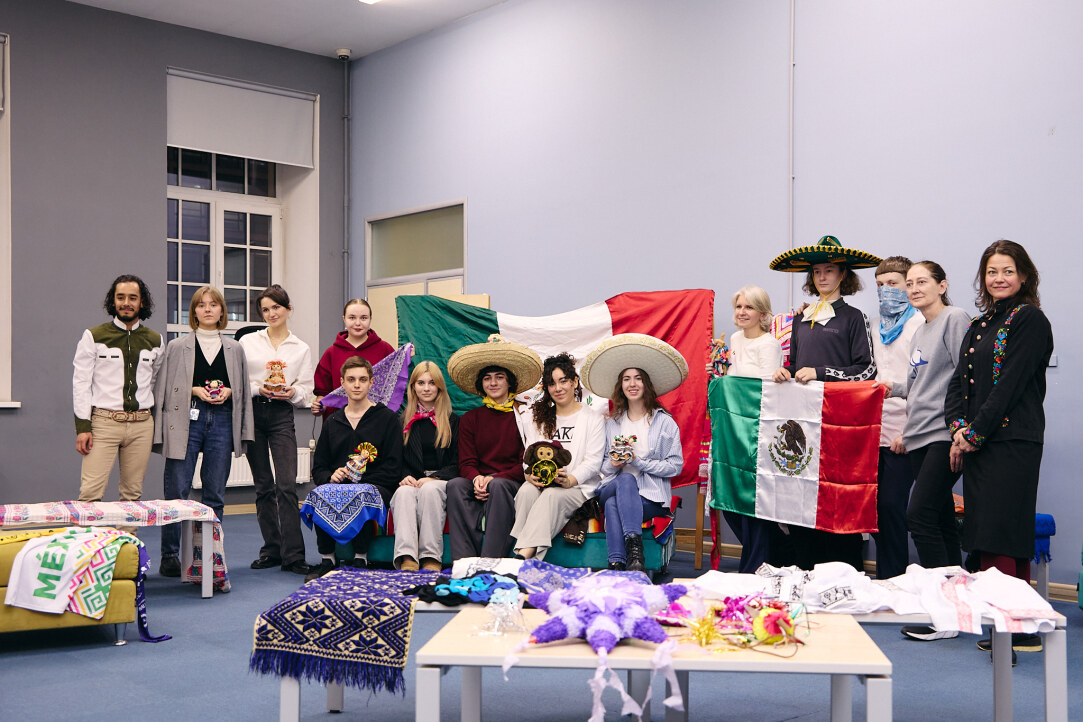‘Latin America Days’ at HSE University-St Petersburg: Introducing Mexican Culture
The HSE building on Kantemirovskaya Street hosted the first meeting of the project 'Mexican Traditions—Why Are Mexicans Always Happy?' Students and professors learnt about national festivals, customs, and traditions in Latin America, as well as opportunities for academic mobility.

The idea for the event originated with Natalia Khazieva, academic supervisor of the 'International Bachelor's in Business and Economics' programme. After a working trip to Latin America, she decided to introduce the university community to the culture of the region. Among the event organisers were two students from Mexico: Gisel Sarahi Vergara Herrera and Juan Antonio Carmona García.

Natalia Khazieva
Senior Lecturer at the Department of Management
Our students feel some uncertainty about the countries of Latin America because of their geographical remoteness and cultural differences. The visit to this region by the HSE University-St Petersburg delegation dispelled a lot of stereotypes.
We would like to show how open, friendly, and unique Latin American countries are and talk about the intricacies of business, media, and politics there. We plan to hold events devoted to the cultures of Mexico, Brazil, and Chile. We hope that our project will help ignite interest in academic mobility in Latin American countries.
Antonio Carmona and Gisel Vergara opened the meeting with a presentation about life in modern Mexico. The students spoke about geographical characteristics, local cuisine, and national and regional symbols. Each state has its cultural trademarks. For instance, in Jalisco, these are bright women's dresses, in Nayarit—shawls with floral, animal, and national prints, and in Queretaro—lele dolls, rag toys with lots of ribbons and decorations. All these things were presented to guests of the event.
The Mexican students showcased some of their national festivals. One of the most important of these is Independence Day, which is celebrated on September 16 to commemorate the country's liberation from Spanish colonial rule. Mexicans mark the occasion by wearing traditional clothes, taking to the streets, and organising lively festivities with songs, dances, and treats. In the evening, they set off fireworks and chant 'Viva Mexico! Viva Liberty!'—the slogan of Independence Day.
Another important festival is the Day of the Dead, celebrated on November 1 and 2. Mexicans believe that on these days, the souls of the dead visit their homes. For this festival, people wear special costumes and decorate houses and streets. Families light paths to their houses with candles, so that the souls can find the way, and decorate cemeteries with ribbons and flowers. Many regions hold carnivals.
Antonio Carmona and Gisel Vergara explained that dances, songs, and fun are a great part of Mexican culture. In their opinion, the ability to take pleasure in every event is the key to happiness.
Sofia Kotereva, Manager of the Student Academic Mobility Unit at HSE University-St Petersburg, shared how HSE students can apply to take part in an academic mobility programme and spend a semester at one of HSE's partner universities in Mexico.

Sofia Kotereva
Manager of the Student Academic Mobility Unit at HSE University-St Petersburg
Now, students can apply to two Mexican universities through the HSE University-St Petersburg competition process: Universidad Panamericana and Universidad de Monterrey.
The main campuses of Universidad Panamericana are located in Mexico and attract students from all over the world. They offer a variety of study fields, which means that students of almost any programme can apply to participate in the exchange programme. Universidad de Monterrey has a strong research base in humanitarian and social sciences, which makes it a perfect place for those students who want to improve their knowledge of sociology, history, and political science.
We are sure that participation in academic mobility programmes will help our students to discover their professional and personal potential.
The application period for academic mobility will last until February 28. For more information about the programmes, number of places, and necessary documents, please see the website.
The organisers also hosted a game in which guests had to read words in Spanish. The most active participants received gifts of national shawls and pinatas—traditional toys with sweets inside.
The evening ended with a dance flash mob—the students from Mexico taught the guests how to perform a national dance. The event gave the participants new insight into Mexico and the real-life atmosphere of Latin American festivals.

Maksim Ovechkin
3rd-year student of the Bachelor's programme 'Law'
I have heard a lot about Mexico before. It was interesting for me to discover this country from a new side. The festive traditions impressed me. In particular, I liked that the atmosphere of the event was cosy and friendly.
I am grateful to the organisers for the various activities and the opportunity to look through everything that they brought from Mexico: sombreros, handwoven fabrics, and souvenirs. I'm looking forward to the next event, and I hope it will be as amazing as this one!

Gisel Vergara
1st-year student of the Master's programme 'Arts and Culture Management'
When I decided to get my master's degree outside Mexico, my options were Russia, Finland, and the UK. But in the end, I opted for Russia because I had visited it before. I love this country so much! So, in August 2024, I moved to St Petersburg and enrolled in HSE University.
My master's thesis supervisor pays a lot of attention to how to involve Russians in academic mobility in Mexico and, vice versa, how to raise Mexicans' interest in exchange programmes with Russia. I was happy to participate in her project. The goal of our work and this event in particular is to share the culture of my homeland, show what our lives are like, and open the doors to our country.
I was so nervous when we started the preparations, but everything went well.
The next meeting is scheduled for February 17 in the building on Kantemirovskaya Street. The topic of the event is the 135th anniversary of the friendship between Russia and Mexico.
Last July, HSE University-St Petersburg launched an interdisciplinary track covering the countries of Latin America. It combines courses from the educational programmes in 'Political Science and World Politics', 'Media Communications', and the 'International Bachelor's in Business and Economics'. Students of this track gain a deep understanding of the nuances of regional politics, economics, and the media sphere while learning Spanish. Students also have the opportunity to visit Latin America on academic mobility programmes, undertake internships, and participate in summer and winter schools held by partner universities.

